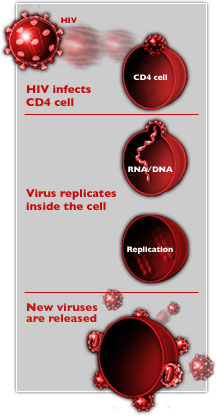By
Liz Highleyman
 C.
Körner and colleagues from the University of Bonn in Germany
conducted a laboratory study to shed further light on their
previous finding that HIV/HCV
coinfected individuals have greater CD4 cell apoptosis --
a type of "cell suicide" -- than HIV
monoinfected individuals.
C.
Körner and colleagues from the University of Bonn in Germany
conducted a laboratory study to shed further light on their
previous finding that HIV/HCV
coinfected individuals have greater CD4 cell apoptosis --
a type of "cell suicide" -- than HIV
monoinfected individuals.
The researchers suggested that this might be a potential mechanism
contributing to accelerated progression to AIDS and increased
mortality in patients with HIV/HCV coinfection. Some studies
have shown that coinfected individuals experience faster HIV
disease progression, but others have not observed this correlation.
Similarly, some studies have shown that coinfected people gain
fewer CD4 cells that HIV monoinfected people after starting
ART, but
others have seen no difference.
In this analysis, the researchers hypothesized that receptor-induced
apoptosis might be a potential cause of this effect, leading
them to look at expression and function of Fas ligand, a transmembrane
protein that causes apoptosis when it binds with its corresponding
Fas "death receptor."
The investigators analyzed blood samples from 130 participants,
including 15 with HCV only,
54 with HIV only, 61 with
HIV/HCV coinfection,
and 15 healthy control subjects with neither virus.
Serum levels of soluble Fas ligand were detected using an ELISA
assay. Surface expression of Fas ligand and Fas receptors on
CD4 T-cells was determined using flow cytometry. Fas ligand-induced
apoptosis was analyzed by incubating isolated peripheral white
blood cells with recombinant human Fas ligand and measuring
subsequent CD4 cell death.
Results
 |
HIV
and HCV monoinfection were both associated with significantly
greater Fas receptor expression on CD4 cells relative to
people with neither virus (60, 63, and 38, respectively). |
 |
The
highest Fas receptor expression, however, was seen in HIV/HCV
coinfected patients (88). |
 |
Fas
receptor expression was strongly correlated with low CD4
cell counts in HIV positive patients. |
 |
In
contrast, elevated levels of soluble and cellular Fas ligand
were seen only in HIV positive people (with or without HCV),
not in those with HCV monoinfection. |
 |
Enhanced
Fas receptor expression in HIV/HCV coinfected patients rendered
CD4 cells significantly more susceptible to Fas ligand-induced
apoptosis. |
 |
Effective
ART normalized serum levels of soluble Fas ligand and expression
of cellular Fas ligand in HIV monoinfected and HIV/HCV coinfected
patients. |
 |
Fas
receptor expression, however, decreased only slightly with
ART, and remained significantly elevated relative to healthy
control subjects. |
"Our
findings suggest a synergistic mechanism in HIV/HCV coinfection
between upregulation of Fas [receptor] expression on CD4+ T-cells
and HIV-induced elevated levels of cellular and soluble Fas
ligand," the investigators concluded. "Together, both
effects contribute to enhanced apoptosis of CD4+ T-cells, which
has been observed in HIV/HCV coinfection."
Internal Medicine I, University of Bonn, Bonn, Germany.
5/4/10
Reference
C Körner, F Tolksdorf, D Schulte, and others. Hepatitis
c co-infection sensitizes CD4+ T cells towards Fas-induced apoptosis
in HIV-positive patients. 45th Annual Meeting of the European
Association for the Study of the Liver (EASL 2010). Vienna,
Austria. April 14-18, 2010. (Abstract).